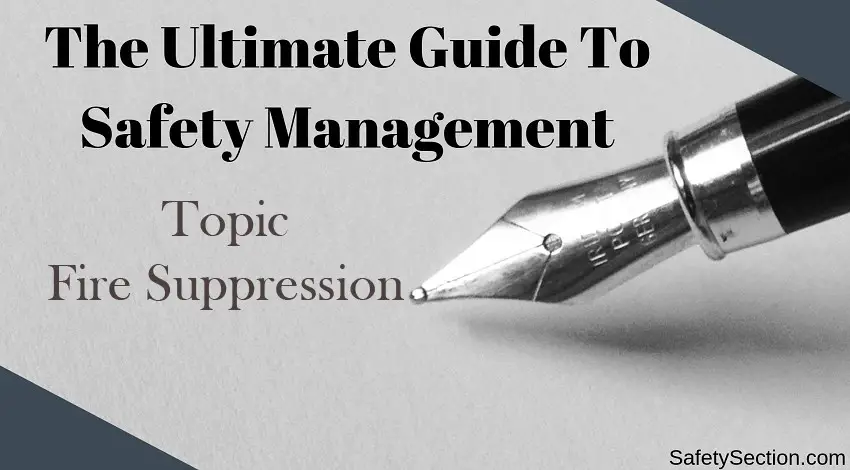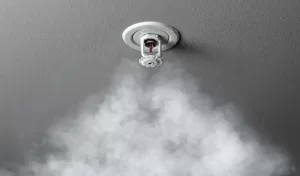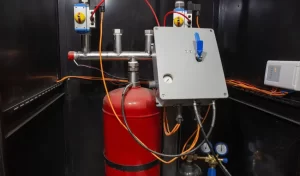Automatic Fire Suppression System
Automatic Fire Suppression System is the best commercial fire system available today. An Automatic system includes a fire sprinkler system, gaseous fire suppression, and condensed aerosol fire suppression.

It’s not necessary for any human intervention. This system controls fire at an early stage and saves lives.
There are numerous types of Automatic Fire Suppression Systems given below:
- Engineered Fire Suppression System
- Pre-Engineered Fire Suppression System
Fixed Fire Installation System

The fixed Fire Installation System is divided into two parts
- By Water Fire Installation System
- Without Water Installation System
The water Fire installation System is given below:
- Sprinkler System
- Hydrant
- Drencher
- Water Spray
- Riser
- Hose Real
Without Water installation System is given below:
- Foam Type System
- Co2 Type System
- Powder System
- Inert Gas
Three Of The Common Types Of Fires Suppression Systems
- Water
- Inert Gasses
- Chemical Agent
Water
Water is the most typically used fire suppressant and the most well-known. You can choose between having an automatic or manual sprinkler system. A fire water spray suppression system will extinguish fires using water and nitrogen from the air.
The nozzle is used to atomize water with nitrogen or other suitable media to come up with mist or fog of finely controlled water droplets. The manual system isn’t connected to an alarm or detector, someone needs to actively trigger the system for it to work.
Inert Gasses

Fires need oxygen to keep going and to spread, which is why inert gasses are an effective fire suppressant. These gasses truly cut off the fire’s Oxygen supply and place the fire out by smothering it.
The release of inert gasses, like purified nitrogen and argon, can be dangerous, but when used properly, they are extremely effective.
These are nitrogen and argon in pure form or mixed at different proportions. These gases are identified as clean total folding fire suppression agents. They are stored in high-pressure gas cylinders.
Chemical Agent
Two types of chemical agents can be used in the fire suppression system. Wet chemicals and Dry chemicals. The most unremarkably known wet chemical is potassium carbonate.
This substance is found in fire extinguishers and is one of the safest fire suppression choices. Potassium carbonate is so safe, it’s been used in winemaking, baking, and even medication.
The most well-known and commonly used dry chemical is sodium bicarbonate. It’s the powder that is thrown over fires to put them out. It too is used in baking and is considered extremely safe for people to use.
Sodium bicarbonate is especially good at extinguishing grease and electrical fires because it turns into soap-like foam, which smothers the fires.
Fixed Fire Suppression System
Type |
Medium |
Principle |
Industries |
Co2 System |
Carbon Di Oxide |
Smothering |
Shipping Industry, Any Enclosed Spaces Fire suppression, Rerolling Mills, Machinery Spaces |
Water Mist |
Water Mist |
Cooling and Smothering |
Automobile, Mining Industry, Paper Mills etc |
High Expansion Foam |
– |
Cooling and Smothering |
Shipping Industry, Air Craft Hanger, Hazardous Material, Waste Storage Areas, Flaming Liquid Storage |
Hypoxic Fire Suppression System |
Oxygen Reduction By Nitrogen |
Inserting |
IT/Freezers, Coolers/Large Ware House |
Aerosol Based |
Potassium Based Aerosol |
Breaking Chemical Reaction |
All Most All Types of Industries |
Why It’s Important To Have A Fire Suppression System?
- Ability to save lives
- Will reduce damage to property and loss
- Stay compliant with regulations
- Provides 24-hour-a-day protection
- Emergency services can be reached immediately
- Normal operations can resume much quicker
Related Resources:
